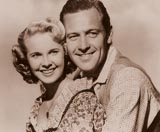
from William Holden
 from William Holden |
Family joke = always say "you're welcome" to anything that sounds like "Thanks" (original joke: what has treads and revolving turret and goes up and down trenches? a tank.) - have some Sanka? - you're welcome
letters = free India, impeach congressman whitley, draft women, quoted article in the New Freedom about love life in Tibet (before family cancelled subscription because magazine turned radical)
Ruth wants Albert to trust her for 24 hours: "you bought war bonds, this is my contribution"
delivery of whole car full of lilacs, 200 boxes of Kandy Korn Krinkles, phonograph playing record "Baby, this is Bill, I love you truly", big stuffed teddy bear, a new gift "every hour on the hour"
Bill and Ruth take bus tour of city, with Albert and Edie - jump out of bus to see Grand Central Station, play "railroad game" with travellers and home folk pretending to meet and kiss
Sgt. arriv es, awaiting orders to go to the Pacific
Albert arrested for stealing nickels to ride train
all sit down to lunch - Bill's plane called "Helen Gone" - Bill and Ruth arrive to announce they are engaged to marry - Sgt has ring that Bill gives to Ruth - telephone call about change in orders for Bill and Chuck, not going overseas but assigned as instructor in Florida, wants an immediate double wedding with Bill and Ruth, Chuck and Martha
Ruth tells Bill the truth, Miriam talks to Bill and Bill suddenly realized that Miriam wrote the letters and Ruth engaged to Albert
Judge marries Chuck and Martha, and then arranges the quick marriage of Bill and Ruth while Albert upstairs arranging for the church. At the end, another one arrives at the front door looking for Ruth - Harold Klobbermeyer!
"Wonderful performances by all. Marvelously executed comedy. For those who don't already know, J.D. Salinger, the author, spotted the movie marquee heralding the stars of this movie, William Holden and Joan Caulfield. Thus, the inspiration for his character's name in "Catcher in the Rye", Holden Caulfield. Looking to the supporting cast, Billy de Wolfe gets to play the same character (or is it really him?),he always plays, prissy and particular. De Wolfe never fails comedically and is a major factor in taking this film over the top. The 2 sequels, Dear Wife and Dear Brat, were showcases for him. Even in the 1960's TV sitcom "Good Morning World", with Joby Baker and Ronnie Schell, de Wolfe's signature character still brought laughs. Now, to Mona Freeman. Although she never achieved major stardom, or any stardom in adulthood, she carved a nice niche for herself playing the precocious teenager in many films. Freeman made enough of a mark in her day to be immortalized (caricatured) in cartoons, just like the more recognize-able Bogey and Bing. Think about it, yup, that was her. In Dear Ruth, Freeman was ever the volunteer or manipulator. She ends up as a very positive female role model. Even more so because of the "place" of women in the 1940's. She was a very talented young lady. Freeman's interaction with her dad, Edward Arnold, is universal and timeless. A fine performance by Arnold "squeezes" all the humor out of what should be typical and predictable dad/daughter(s) comedy. Arnold was the perfect choice for the dad. This was a very funny ensemble performance. It's great family entertainment. Dear Ruth was deserving of 2 sequels...."